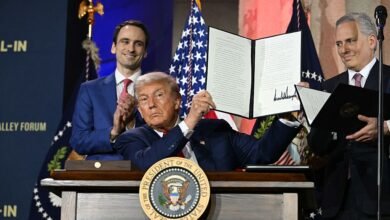GenAI Deregulation Linked to Broadband Funding in New Bill

▼ Summary
– The article criticizes the “One Big Beautiful Bill” currently in Congress.
– A major concern is how the bill addresses tech industry issues.
– The proposed freeze on state and local governments’ actions is particularly disliked.
– The author expresses strong disapproval of the bill’s approach to these matters.
– The tech industry provisions are highlighted as a key problem in the legislation.
A controversial new legislative package making waves in Congress ties artificial intelligence deregulation directly to broadband infrastructure funding, sparking debate among policymakers and tech industry leaders. The so-called “One Big Beautiful Bill” bundles multiple contentious provisions, with its approach to technology regulation drawing particular scrutiny from critics.
At the heart of the controversy lies a proposed freeze on state and local governments’ ability to regulate generative AI technologies, effectively preventing them from imposing stricter rules than federal standards. This provision has raised concerns among consumer advocates and privacy experts who argue it could undermine efforts to address AI-related risks at the community level.
Simultaneously, the bill allocates significant funding for broadband expansion, particularly in underserved rural areas, a move that has garnered bipartisan support. However, critics contend that linking these popular infrastructure investments to controversial AI deregulation creates an unnecessary and problematic connection between unrelated policy areas.
Tech industry groups have largely welcomed the proposed limitations on local AI regulations, arguing that a patchwork of state laws could stifle innovation and create compliance headaches for businesses operating across multiple jurisdictions. Meanwhile, civil society organizations warn that preempting local authority might leave gaps in consumer protections as AI systems become more pervasive in daily life.
The legislation’s bundling strategy has drawn comparisons to previous omnibus bills where popular measures carried more contentious provisions. Observers note this approach makes it difficult for lawmakers to oppose specific elements without rejecting entire sections of funding or policy reforms.
As debates continue, the bill’s future remains uncertain, with potential amendments expected as it moves through committee reviews. The outcome could significantly influence how AI governance and digital infrastructure priorities evolve in coming years, making this one of the most closely watched tech policy battles currently unfolding in Washington.
(Source: COMPUTERWORLD)





